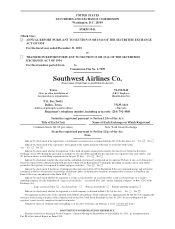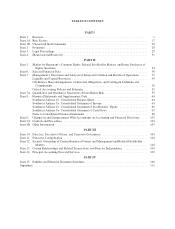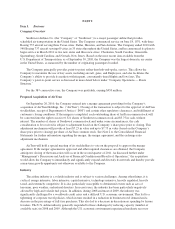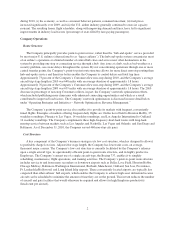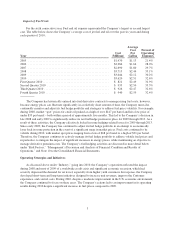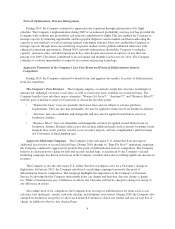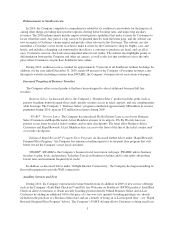Southwest Airlines 2010 Annual Report Download - page 15
Download and view the complete annual report
Please find page 15 of the 2010 Southwest Airlines annual report below. You can navigate through the pages in the report by either clicking on the pages listed below, or by using the keyword search tool below to find specific information within the annual report.opportunity to book in advance to take advantage of a lower fare (including a fare sale) ticket by redeeming
fewer points or by being able to redeem more points and book at the last minute if seats are still available for
sale. Rapid Rewards members will also be able to earn points through qualifying purchases with Rapid Rewards
Partners. In addition, Rapid Rewards Credit Cardmembers will be able to redeem their points for items other than
travel on Southwest Airlines, such as international flights, cruises, hotel stays, rental cars, gift cards, event
tickets, and more. In addition to earning points for revenue flights, Rapid Rewards Members will have the ability
to purchase points.
The new frequent flyer program also features enhanced A-List and Companion Pass programs for the most
active members, and adds a new level of status, “A-List Preferred.” Both A-List and A-List Preferred Members
will enjoy benefits such as priority checkin and security lane and ticket counter access, dedicated phone lines,
standby priority, and an earnings bonus on eligible revenue flights (25% for A-List and 100% for A-List
Preferred). In addition, A-List Preferred Members will enjoy free Inflight WiFi on equipped flights.
The new program has been designed to drive more revenue by (i) bringing in new Customers; (ii) increasing
business from existing Customers; and (iii) strengthening the Company’s Rapid Rewards hotel, rental car, credit
card, and retail partnerships.
Management Information Systems
The Company has continued its commitment to technology improvements to support its ongoing operations
and initiatives. During 2010, the Company completed the integration of a new SAP Enterprise Resource Planning
application, which replaced the Company’s general ledger, accounts payable, accounts receivable, payroll,
benefits, cash management, and fixed asset systems. The conversion was designed to improve the Company’s
key business processes by implementing an integrated tool to increase efficiency, consistency, data accuracy, and
cost effectiveness. In addition, the Company has invested in significant technology necessary to support its new
Rapid Rewards frequent flyer program, enhanced southwest.com website, and WiFi implementation. The
Company has also made the decision to embark on a project that will result in the replacement of its reservations
system over the next several years.
Regulation
The airline industry is heavily regulated, especially by the federal government. Examples of regulations
affecting the Company and/or the industry are discussed below.
Economic and Operational Regulation
The U.S. Department of Transportation. The U.S. Department of Transportation (the “DOT”) regulates
aviation safety, as well as economic, consumer protection, and civil rights matters. The DOT may impose civil
penalties on air carriers for violating its regulations.
To provide passenger transportation in the United States, a domestic airline is required to hold a
Certificate of Public Convenience and Necessity issued by the DOT. A certificate is unlimited in duration, and
the Company’s certificate generally permits it to operate among any points within the United States and its
territories and possessions. Additional DOT authority, in the form of a certificate or exemption from certificate
requirements, is required for a U.S. airline to serve foreign destinations either with its own aircraft or via
codesharing with another airline. The DOT may revoke a certificate or exemption, in whole or in part, for
intentional failure to comply with federal aviation statutes, regulations, orders, or the terms of the certificate
itself.
The DOT’s consumer protection and enforcement activities relate to areas such as unfair and deceptive
practices and unfair competition by air carriers, deceptive airline advertising (e.g., fare, on-time performance,
schedule, and codesharing), and violations of rules concerning denied boarding compensation, ticket refunds,
9


